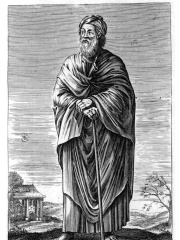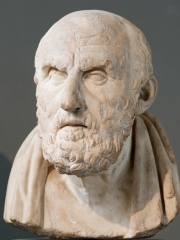







The Most Famous
PHILOSOPHERS from Türkiye
This page contains a list of the greatest Turkish Philosophers. The pantheon dataset contains 1,267 Philosophers, 58 of which were born in Türkiye. This makes Türkiye the birth place of the 7th most number of Philosophers behind Italy, and Greece.
Top 10
The following people are considered by Pantheon to be the top 10 most legendary Turkish Philosophers of all time. This list of famous Turkish Philosophers is sorted by HPI (Historical Popularity Index), a metric that aggregates information on a biography's online popularity. Visit the rankings page to view the entire list of Turkish Philosophers.

1. Thales of Miletus (623 BC - 546 BC)
With an HPI of 89.06, Thales of Miletus is the most famous Turkish Philosopher. His biography has been translated into 115 different languages on wikipedia.
Thales of Miletus ( THAY-leez; Ancient Greek: Θαλῆς; c. 626/623 – c. 548/545 BC) was an Ancient Greek pre-Socratic philosopher from Miletus in Ionia, Asia Minor. Thales was one of the Seven Sages, founding figures of Ancient Greece. Beginning in eighteenth-century historiography, many came to regard him as the first philosopher in the Greek tradition, breaking from the prior use of mythology to explain the world and instead using natural philosophy. He is thus otherwise referred to as the first to have engaged in mathematics, science, and deductive reasoning. Thales's view that all of nature is based on the existence of a single ultimate substance, which he theorized to be water, was widely influential among the philosophers of his time. Thales thought the Earth floated on water. In mathematics, Thales is the namesake of Thales's theorem, and the intercept theorem can also be referred to as Thales's theorem. Thales was said to have calculated the heights of the pyramids and the distance of ships from the shore. In science, Thales was an astronomer who reportedly predicted the weather and a solar eclipse. The discovery of the position of the constellation Ursa Major is also attributed to Thales, as well as the timings of the solstices and equinoxes. He was also an engineer, known for having allowed the Lydian army to cross the Halys River. Plutarch wrote that "at that time, Thales alone had raised philosophy from mere speculation to practice."

2. Heraclitus (535 BC - 470 BC)
With an HPI of 89.05, Heraclitus is the 2nd most famous Turkish Philosopher. His biography has been translated into 95 different languages.
Heraclitus (; Ancient Greek: Ἡράκλειτος, romanized: Hērákleitos; fl. c. 500 BC) was an ancient Greek pre-Socratic philosopher from the city of Ephesus, which was then part of the Persian Empire. He exerts a wide influence on Western philosophy, both ancient and modern, through the works of such authors as Plato, Aristotle, Georg Wilhelm Friedrich Hegel, Friedrich Nietzsche, and Martin Heidegger. Little is known of Heraclitus's life. He wrote a single work, of which only fragments survive. Even in ancient times, his paradoxical philosophy, appreciation for wordplay, and cryptic, oracular epigrams earned him the epithets "the dark" and "the obscure". He was considered arrogant and depressed, a misanthrope who was subject to melancholia. Consequently, he became known as "the weeping philosopher" in contrast to the ancient atomist philosopher Democritus, who was known as "the laughing philosopher". The central ideas of Heraclitus's philosophy are the unity of opposites and the concept of change. Heraclitus saw harmony and justice in strife. He viewed the world as constantly in flux, always "becoming" but never "being". He expressed this in sayings like "Everything flows" (Greek: πάντα ῥεῖ, panta rhei) and "No man ever steps in the same river twice". This insistence upon change contrasts with that of the ancient philosopher Parmenides, who believed in a reality of static "being". Heraclitus believed fire was the arche, the fundamental stuff of the world. In choosing an arche Heraclitus followed the Milesians before him — Thales of Miletus with water, Anaximander with apeiron ("boundless" or "infinite"), and Anaximenes of Miletus with air. Heraclitus also thought the logos (lit. word, discourse, or reason) gave structure to the world or existed as a kind of divine law.

3. Diogenes (404 BC - 322 BC)
With an HPI of 88.38, Diogenes is the 3rd most famous Turkish Philosopher. His biography has been translated into 84 different languages.
Diogenes the Cynic (, dy-OJ-in-eez; c. 413/403 – c. 324/321 BC), also known as Diogenes of Sinope, was an ancient Greek philosopher and one of the founders of Cynicism. Renowned for his ascetic lifestyle, biting wit, and radical critiques of social conventions, he became a legendary figure whose life and teachings have been recounted, often through anecdote, in both antiquity and later cultural traditions. Diogenes was born to a prosperous family in Sinope. His life took a dramatic turn following a scandal involving the debasement of coinage, an event that led to his exile and ultimately his radical rejection of conventional values. Embracing a life of poverty and self-sufficiency, he became famous for his unconventional behaviours that openly challenged societal norms, such as living in a jar or wandering public spaces with a lit lantern in daylight, claiming to be "looking for a man", that is to say "for a wise man" (sophos). Diogenes advocated for a return to nature, the renunciation of wealth, and introduced early ideas of cosmopolitanism by proclaiming himself a "citizen of the world". His memorable encounters, including that with Alexander the Great, along with various accounts of his death, have made him a lasting symbol of philosophical defiance to established authorities and artificial values.

4. Anaximander (610 BC - 546 BC)
With an HPI of 83.48, Anaximander is the 4th most famous Turkish Philosopher. His biography has been translated into 87 different languages.
Anaximander ( an-AK-sih-MAN-dər; Ancient Greek: Ἀναξίμανδρος Anaximandros; c. 610 – c. 546 BC) was a pre-Socratic Greek philosopher who lived in Miletus, a city of Ionia (in modern-day Turkey). He belonged to the Milesian school and learned the teachings of his master Thales. He succeeded Thales and became the second master of that school, where he counted Anaximenes and, arguably, Pythagoras amongst his pupils. Little of his life and work is known today. According to available historical documents, he is the first philosopher known to have written down his studies, although only one fragment of his work remains. Fragmentary testimonies found in documents after his death provide a portrait of the man. Anaximander was an early proponent of science and tried to observe and explain different aspects of the universe, with a particular interest in its origins, claiming that nature is ruled by laws, just like human societies, and anything that disturbs the balance of nature does not last long. Like many thinkers of his time, Anaximander's philosophy included contributions to many disciplines. In astronomy, he attempted to describe the mechanics of celestial bodies in relation to the Earth. In physics, his postulation that the infinite (or apeiron) was the source of all things, led Greek philosophy to a new level of conceptual abstraction. His knowledge of geometry allowed him to introduce the gnomon in Greece. He created a map of the world that contributed greatly to the advancement of geography. Anaximander was involved in the politics of Miletus and was sent as a leader to one of its colonies.

5. Anaxagoras (500 BC - 428 BC)
With an HPI of 82.89, Anaxagoras is the 5th most famous Turkish Philosopher. His biography has been translated into 79 different languages.
Anaxagoras (; Ancient Greek: Ἀναξαγόρας, Anaxagóras, 'lord of the assembly'; c. 500 BC – c. 428 BC) was a Pre-Socratic Greek philosopher. Born in Clazomenae at a time when Asia Minor was under the control of the Persian Empire, Anaxagoras came to Athens. In later life he was charged with impiety and went into exile in Lampsacus. Responding to the claims of Parmenides on the impossibility of change, Anaxagoras introduced the concept of Nous (Cosmic Mind) as an ordering force. He also gave several novel scientific accounts of natural phenomena, including the notion of panspermia, that life exists throughout the universe and could be distributed everywhere. He deduced a correct explanation for eclipses and described the Sun as a fiery mass larger than the Peloponnese, and also attempted to explain rainbows and meteors. He also speculated that the sun might be just another star.

6. Epictetus (50 - 135)
With an HPI of 81.53, Epictetus is the 6th most famous Turkish Philosopher. His biography has been translated into 70 different languages.
Epictetus (, EH-pick-TEE-təss; Ancient Greek: Ἐπίκτητος, Epíktētos; c. 50 – c. 135 AD) was a Greek Stoic philosopher. He was born into slavery at Hierapolis, Phrygia (present-day Pamukkale, in western Turkey) and lived in Rome until his banishment, after which he spent the rest of his life in Nicopolis in northwestern Greece. Epictetus studied Stoic philosophy under Musonius Rufus and after manumission, his formal emancipation from slavery, he began to teach philosophy. When philosophers were banished from Rome by Emperor Domitian toward the end of the first century, Epictetus founded a school of philosophy in Nicopolis. He taught that philosophy is a way of life and not simply a theoretical discipline. To Epictetus, all external events are beyond our control; he argues that we should accept whatever happens calmly and dispassionately. However, he held that individuals are responsible for their own actions, which they can examine and control through rigorous self-discipline. His teachings were written down and published by his pupil Arrian in his Discourses and Enchiridion. They influenced many later thinkers, including Marcus Aurelius, Pascal, Diderot, Montesquieu, Rabelais, and Samuel Johnson.

7. Xenophanes (570 BC - 475 BC)
With an HPI of 80.90, Xenophanes is the 7th most famous Turkish Philosopher. His biography has been translated into 72 different languages.
Xenophanes of Colophon ( zə-NOF-ə-neez; Ancient Greek: Ξενοφάνης ὁ Κολοφώνιος [ksenopʰánɛːs ho kolopʰɔ̌ːnios]; c. 570 – c. 478 BC) was a Greek philosopher, theologian, poet, and critic of Homer. He was born in Ionia and travelled throughout the Greek-speaking world in early classical antiquity. As a poet, Xenophanes was known for his critical style, writing poems that are considered among the first satires. He composed elegiac couplets that criticised his society's traditional values of wealth, excesses, and athletic victories. He criticised Homer and the other poets in his works for representing the gods as foolish or morally weak. His poems have not survived intact; only fragments of some of his work survive in quotations by later philosophers and literary critics. Xenophanes is seen as one of the most important pre-Socratic philosophers. A highly original thinker, Xenophanes sought explanations for physical phenomena such as clouds or rainbows without references to divine or mythological explanations, but instead based on first principles. He distinguished between different forms of knowledge and belief, an early instance of epistemology. Later philosophers such as the Eleatics and the Pyrrhonists saw Xenophanes as the founder of their doctrines, and interpreted his work in terms of those doctrines, although modern scholarship disputes these claims.

8. Leucippus (500 BC - 500 BC)
With an HPI of 80.59, Leucippus is the 8th most famous Turkish Philosopher. His biography has been translated into 69 different languages.
Leucippus (; Λεύκιππος, Leúkippos; fl. 5th century BCE) was a pre-Socratic Greek philosopher. He is traditionally credited as the founder of atomism, which he developed with his student Democritus. Leucippus divided the world into two entities: atoms, indivisible particles that make up all things, and the void, the nothingness that exists between the atoms. He developed his philosophy as a response to the Eleatics, who believed that all things are one and the void does not exist. Leucippus's ideas were influential in ancient and Renaissance philosophy. Leucippus was the first Western philosopher to develop the concept of atoms, but his ideas only bear a superficial resemblance to modern atomic theory. Leucippus's atoms come in infinitely many forms and exist in constant motion, creating a deterministic world in which everything is caused by the collisions of atoms. Leucippus described the beginning of the cosmos as a vortex of atoms that formed the Earth, the Sun, the stars, and other celestial bodies. As Leucippus considered both atoms and the void to be infinite, he presumed that other worlds must exist as cosmoses are formed elsewhere. Leucippus and Democritus described the soul as an arrangement of spherical atoms, which are cycled through the body through respiration and create thought and sensory input. The only records of Leucippus come from Aristotle and Theophrastus, ancient philosophers who lived after him, and little is known of his life. Most scholars agree that Leucippus existed, but some have questioned this, instead attributing his ideas purely to Democritus. Contemporary philosophers rarely distinguish their respective ideas. Two works are attributed to Leucippus (The Great World System and On Mind), but all of his writing has been lost with the exception of one sentence.

9. Gregory of Nazianzus (329 - 389)
With an HPI of 80.37, Gregory of Nazianzus is the 9th most famous Turkish Philosopher. His biography has been translated into 68 different languages.
Gregory of Nazianzus (Koine Greek: Γρηγόριος ὁ Ναζιανζηνός, romanized: Grēgórios ho Nazianzēnós, IPA: [ɣriˈɣo.ri.os o na.zi.an.ziˈnos]; c. 329 – 25 January 390), also known as Gregory the Theologian or Gregory Nazianzen, was an early Roman Christian theologian and prelate who served as Archbishop of Constantinople from 380 to 381. He is widely considered the most accomplished rhetorical stylist of the patristic age. As a classically trained orator and philosopher, he infused Hellenism into the early Church, establishing the paradigm of Byzantine theologians and church officials. Gregory made a significant impact on the shape of Trinitarian theology among both Greek and Latin-speaking theologians, and he is remembered as the "Trinitarian Theologian". Much of his theological work continues to influence modern theologians, especially in regard to the relationship among the three Persons of the Trinity. Along with the brothers Basil of Caesarea and Gregory of Nyssa, he is known as one of the Cappadocian Fathers. Gregory of Nazianzus is a saint in both Eastern and Western Christianity. In the Catholic Church he is numbered among the Doctors of the Church; in the Eastern Orthodox Church and the Eastern Catholic Churches he is revered as one of the Three Holy Hierarchs, along with Basil of Caesarea and John Chrysostom. He is considered one of the Great Fathers in both Eastern and Western Christianity. He was considered the patron saint of Kotromanić dynasty and medieval Bosnia during the first half of the 15th century, while Saint George, the miracle-worker, has been the patron saint since at least mid-13th century, although confirmed by the papacy much later in 1461. Saint Gregory the Great was also considered the patron of both the state and dynasty in the late 15th century. He is also one of only three men in the life of the Orthodox Church who have been officially designated "Theologian" by epithet, the other two being John the Apostle, and Symeon the New Theologian.

10. Ibn Taymiyyah (1263 - 1328)
With an HPI of 77.67, Ibn Taymiyyah is the 10th most famous Turkish Philosopher. His biography has been translated into 64 different languages.
Ibn Taymiyya (Arabic: ٱبْن تَيْمِيَّة; 22 January 1263 – 26 September 1328) was a Sunni Muslim scholar, jurist, Mujtahid, traditionist, Qadiri Sufi, proto-Salafi theologian and iconoclast. Born in Harran in 1263 CE and fleeing from the Mongol invasion, he was taught by his grandfather and father in the principles of Islamic Jurisprudence at Damascus. Ibn Taymiyya proved to be a controversial figure among both his contemporaries and in later centuries. Clerics and state authorities accused Ibn Taymiyya and his disciples of anthropomorphism, which eventually led to the censoring of his works and subsequent incarceration. Nevertheless, he emerged as one of the forefathers of the Salafi movement. Throughout his treatises, Ibn Taymiyya asserted there is no contradiction between reason and revelation, and denounced the usage of philosophy as a pre-requisite in seeking religious truth. As a cleric who viewed Shiism as a source of corruption in Muslim societies, Ibn Taymiyya was also known for his anti-Shia polemics throughout treatises such as Minhaj al-Sunna, wherein he denounced the Imami Shia creed as heretical. He issued a ruling to wage jihad against the Shias of Kisrawan and personally fought in the Kisrawan campaigns himself, accusing Shias of acting as the fifth-columnists of the Frank Crusaders and Mongol Ilkhanids. He is also known for his diplomatic involvement with the Ilkhanid ruler Ghazan Khan at the Battle of Marj al-Saffar, which ended the Mongol invasions of the Levant. A legal jurist of the Hanbali school, Ibn Taymiyya's condemnation of numerous Sufi practices associated with saint veneration and visitation of tombs made him a controversial figure with many rulers and scholars of the time, which caused him to be imprisoned several times as a result. Within recent history, Ibn Taymiyya has been widely regarded as a major scholarly influence in militant Islamist movements, such as Salafi jihadism. Major aspects of his teachings, had a profound influence on Muhammad ibn Abd al-Wahhab, the founder of the Wahhabism reform movement formed in the Arabian Peninsula, as well as other later Sunni scholars. Syrian Salafi theologian Muhammad Rashid Rida, one of the major modern proponents of Ibn Taymiyya's works, designated him as the Mujaddid of the 7th Islamic century. Ibn Taymiyya's doctrinal positions, such as his takfir of the Mongol Ilkhanids and allowing jihad against other Muslims, were referenced by later Islamist political movements, including the Muslim Brotherhood, Hizb ut-Tahrir, al-Qaeda, and Islamic State, to justify social uprisings against the contemporary governments of the Muslim world. Ibn Taymiyya has been used by Wahhabism and Salafism for anti-Sufi rhetorics. However, from a historical perspective, this is an inaccurate portrayal of ibn Taimiyya, based on selective and out-of-context use of some of his writings by fundamentalist movements. While he sometimes criticized certain practices associated with Sufism, he acknowledged that Sufism is an integral part of Islam and praised many Sufi masters; he himself was affiliated with the Qadiriyya order.. He also heavily condemned the killing of civilians, calling it "corruption that Allah and His Messenger hates."
People
Pantheon has 58 people classified as Turkish philosophers born between 623 BC and 1950. Of these 58, 1 (1.72%) of them are still alive today. The most famous living Turkish philosophers include Seyla Benhabib. The most famous deceased Turkish philosophers include Thales of Miletus, Heraclitus, and Diogenes.
Living Turkish Philosophers
Go to all RankingsDeceased Turkish Philosophers
Go to all RankingsThales of Miletus
623 BC - 546 BC
HPI: 89.06
Heraclitus
535 BC - 470 BC
HPI: 89.05
Diogenes
404 BC - 322 BC
HPI: 88.38
Anaximander
610 BC - 546 BC
HPI: 83.48
Anaxagoras
500 BC - 428 BC
HPI: 82.89
Epictetus
50 - 135
HPI: 81.53
Xenophanes
570 BC - 475 BC
HPI: 80.90
Leucippus
500 BC - 500 BC
HPI: 80.59
Gregory of Nazianzus
329 - 389
HPI: 80.37
Ibn Taymiyyah
1263 - 1328
HPI: 77.67
Anaximenes of Miletus
585 BC - 525 BC
HPI: 76.96
Chrysippus
281 BC - 208 BC
HPI: 76.28




